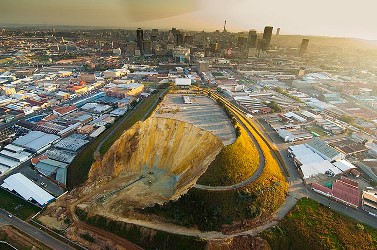Back to the future of mining
-
There’s still gold in them thar hills…
When the mine dumps that dot Gauteng’s landscape from east to west are gone – reprocessed to extract more gold – then what? The material will be moved to one huge site, freeing up land for development, and the company that owns that material, DRDGold, will need a new way to wring even more value out of it.
Wits, jobs and South Africa go where the minerals go. It’s been that way for 120 years. So it’s vital to know how to get at the minerals in future, especially as ore grades fall.
The School of Chemical and Metallurgical Engineering has formed a partnership with DRDGold to develop the technology that will be required to recover gold from the mega-dump 20 years from now.
The company has committed R1,2-million a year for five years to fund one PhD and four MSc students and to buy the equipment necessary to research this area. As the only company in South Africa that processes surface material, and one that has no underground mining operations, DRDGold needs this technology to sustain an existence that dates back to 1895. It has 700-million tons of material containing a resource of about 12-million ounces of gold: enough to keep it going for a while.

Professor Marek Dworzanowski says the new approach to extracting this gold will be a radical departure from the past. It won’t use cyanide and the type of equipment used will be different.
There are no intellectual property restrictions on the research results, partly because there is no real competition between gold mining companies in this field.
Prof Dworzanowski, who worked in the mining industry until recently, will be supervising the postgraduate students along with hydrometallurgist Prof Selo Ndlovu. He hopes that the research funding partnership with DRDGold will be the first of many of its kind, enabling Wits to train more postgraduates and helping the industry to find cost-effective solutions.
* Wits academics are also involved in debates about broader mining issues, as this article by Dr Fola Adeleke (PhD 2014) in The Conversation indicates.


